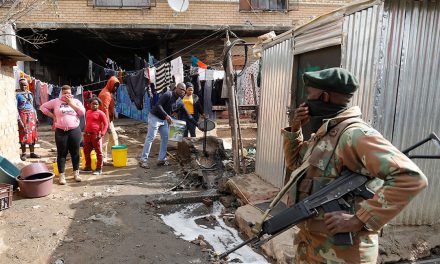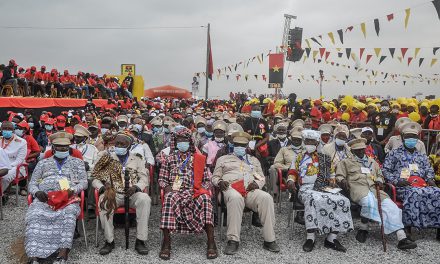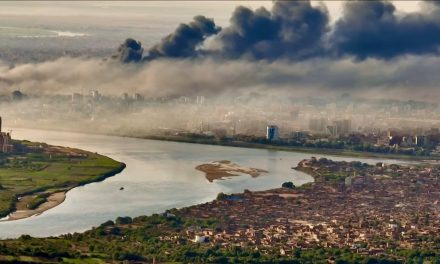A sustained combination of internal and external pressure is required to create a genuine civilian government in Zimbabwe
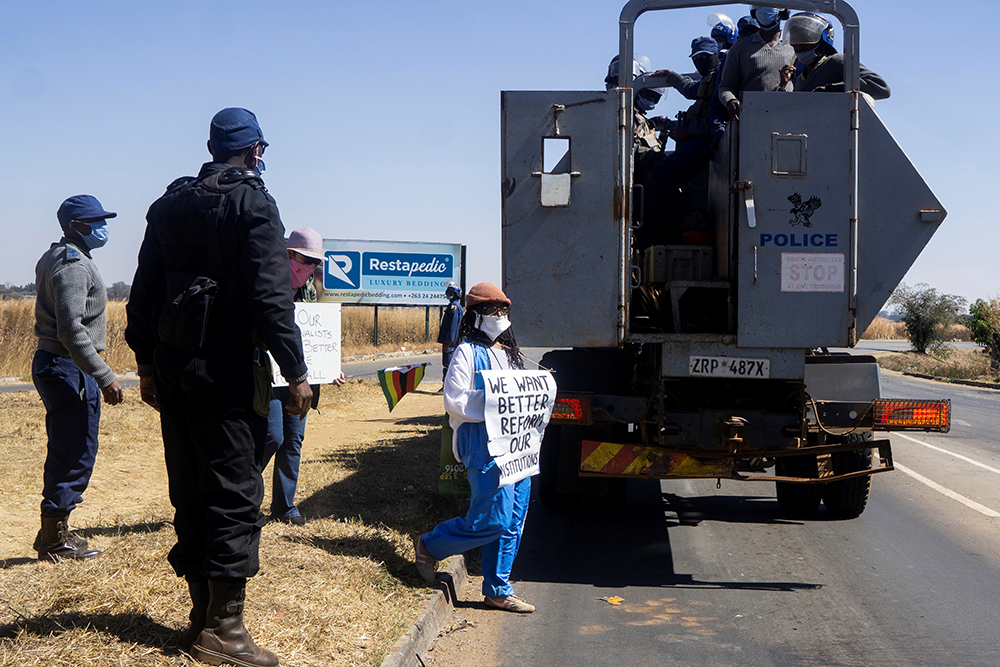
Zimbabwean novelist Tsitsi Dangarembga (C) and colleague Julie Barnes hold placards as they are arrested during an anti-corruption protest march on July 31, 2020 in Harare. Police were enforcing a ban on protests coinciding with the anniversary of President Emmerson Mnangagwa’s election. PHOTO: ZINYANGE AUNTONY/AFP
Ahead of planned mass protests on July 31, Zimbabwe’s state security apparatus cracked down on citizens. Largely initiated via social media, the calls for the protests galvanised popular sentiment and mobilised citizens to exercise a co-ordinated political voice against corruption, the failing economy and repression.
The regime responded by sending a strong signal to would-be dissenters. In a startling resemblance to events unfolding in Belarus, it arrested journalists and detained, abducted and tortured opposition members, or indeed anyone appearing to question the state.
For consistently exposing government malfeasance and corruption, veteran journalist Hopewell Chin’ono was abducted from his home on July 20. In particular, Chin’ono had revealed Covid-19 related corruption to the tune of $60m.
He is being unlawfully detained at the Chikurubi Maximum Security Prison. Arrested on the same day was Jacob Ngarivhume, who had been spearheading the calls for a July 31 protest.
Both were spuriously charged under the auspices of inciting citizens to participate in public violence. Chin’ono’s lawyer, Beatrice Mtetwa, was then accused of treating the court with contempt because of comments on a Facebook page associated with her.
She has since been barred from defending Chin’ono in a mockery of the rule of law.
In addition to these arrogations of justice, the military junta imposed a dusk-to-dawn curfew (ostensibly to slow the spread of Covid-19) and openly beat citizens and opposition members.
Five senior members of the Movement for Democratic Change Alliance (MDC-A) and its two vice-presidents have recently appeared in court, along with other activists. The Zimbabwean judiciary has been co-opted by Zanu-PF, and opposition groups and many civil society organisations have been infiltrated by the regime.
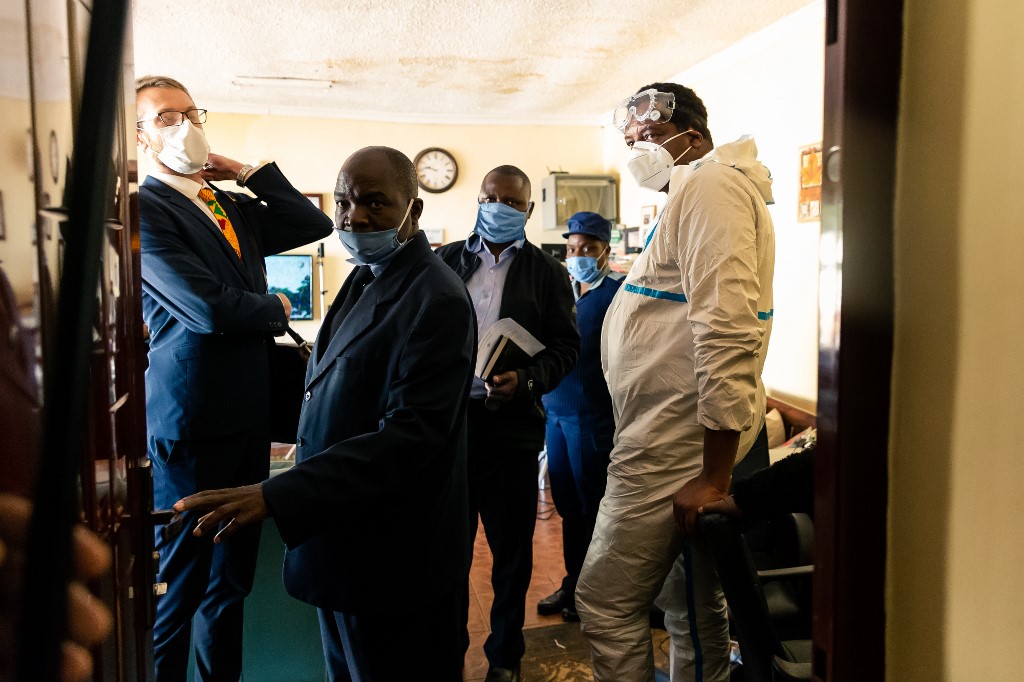
Zimbabwean journalist and documentary filmmaker Hopewell Chin’ono (R) watches while police search of his offices in Harare on July 21, 2020, a day after he was arrested and charged with incitement to commit public violence. PHOTO: JEKESAIi NJIKIZANA / AFP
The government then attacked a judicious pastoral letter by the Catholic Bishops Conference, stating that the letter’s “evil message reeks with all the vices that have perennially hobbled the progress of Africa”.
It accuses the archbishop of “fanning the psychosis of tribal victimisation”, dismissing the Gukurahundi massacre of the early 1980s as a mere “dark spot”. It is far worse than that, with upwards of 20,000 people recklessly murdered while the very perpetrators hold positions of power today.Despite this narrowing of the democratic space in Zimbabwe over recent months, largely behind the smokescreen of Covid-19, the Southern African Development Community has failed to condemn the behaviour of the regime.
Bilaterally, SA eventually responded by sending the first of what will likely be a number of diplomatic envoys to Zimbabwe. SA is at least now shedding the hollow excuse of non-interference in the affairs of a sovereign state that tends to animate foreign policy.
Through premeditated violence, the July 31 mass protests were scuppered before they started. Hopes of a southern Arab Spring were dashed. Does this suggest that public protest is not worth it, especially given that the Arab Spring largely turned to a prolonged winter of discontent?
No. Were it not for the planned uprising, the world would have continued to turn a blind eye. Some serious focus is now directed towards Zimbabwe, particularly through the #ZimbabweanLivesMatter campaign.
This is a necessary — if insufficient — condition for change, given the state’s denial of the crisis and its culpability in human rights violations.
A sustained combination of internal and external pressure is now required to convince the military to relinquish power and create the space for a genuine civilian government to be formed.
Internally, the probability of a credible coup attempt seems low. The 2017 coup that ended Robert Mugabe’s 37-year rule is historically anomalous. Constantino Chiwenga (the vice-president) appears unlikely to upend President Emmerson Mnangagwa, despite apparent tensions between them.
Had credible internal support for a coup existed, it is difficult to see why Chiwenga wouldn’t have launched one already.
When Mnangagwa retired four generals loyal to Chiwenga in early 2019, that would, presumably, have been the opportunity. Either way, the internal dynamics of the governing coalition (and state-military relations) are not stable and could potentially be exploited to effect change.
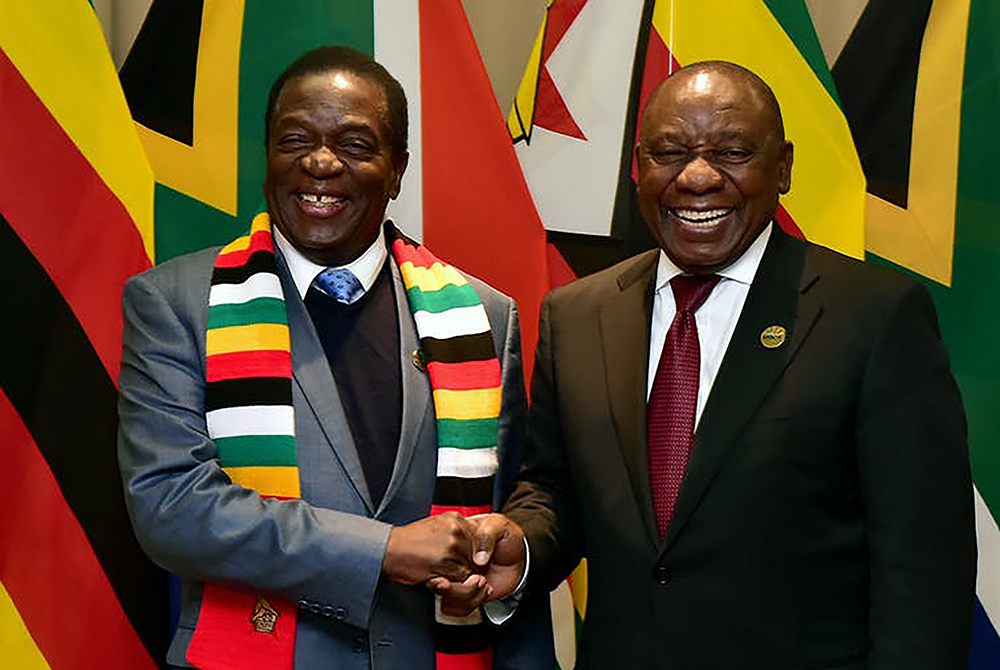
South Africa president Cyril Ramaphosa with his Zimbabwean counterpart, Emmerson Mnangagwa. PHOTO: GCIS
The probability of free and fair elections being held any time soon is close to zero. The last elections (2018) were a charade and resulted in a predictable unleashing of violence against citizens. Economically, the situation is dire, with 90% of the population out of formal employment and inflation above 700%.
As a result, citizen appetite for revolt appears ripe. While the regime’s calculus is that repression is less costly than reform, an active citizenry can nonetheless win out.
Externally, global powers presumably have a direct self-interest in ensuring regional stability and need to step up to the plate.
But the US and the UK face intense pressures on the home front that they are struggling to address. And China and Russia hardly epitomise respect for human rights. Their respective leaders have shattered internal power-sharing mechanisms and are hardly likely to condemn Zimbabwe for pursuing autocratic consolidation.
SA — its political leaders and its businesses with interests in Zimbabwe (such as Anglo Platinum, Implats, Old Mutual and Pick n Pay) — will therefore have to intensify efforts to intervene fruitfully in Zimbabwe. A serious second envoy, including President Cyril Ramaphosa himself, is surely the next step.
Below is a World Economic Forum video on the role of civil society in shaping a future where people matter.
This article first appeared in the South African newspaper Business Day here.
Dr Ross Harvey is a natural resource economist and policy analyst, and he has been dealing with governance issues in various forms across this sector since 2007. He has a PhD in economics from the University of Cape Town, and his thesis research focused on the political economy of oil and institutional development in Angola and Nigeria. While completing his PhD, Ross worked as a senior researcher on extractive industries and wildlife governance at the South African Institute of International Affairs (SAIIA), and in May 2019 became an independent conservation consultant. Ross’s task at GGA is to establish a non-renewable natural resources project (extractive industries) to ensure that the industry becomes genuinely sustainable and contributes to Africa achieving the Sustainable Development Goals (SDGs). Ross was appointed Director of Research and Programmes at GGA in May 2020.




